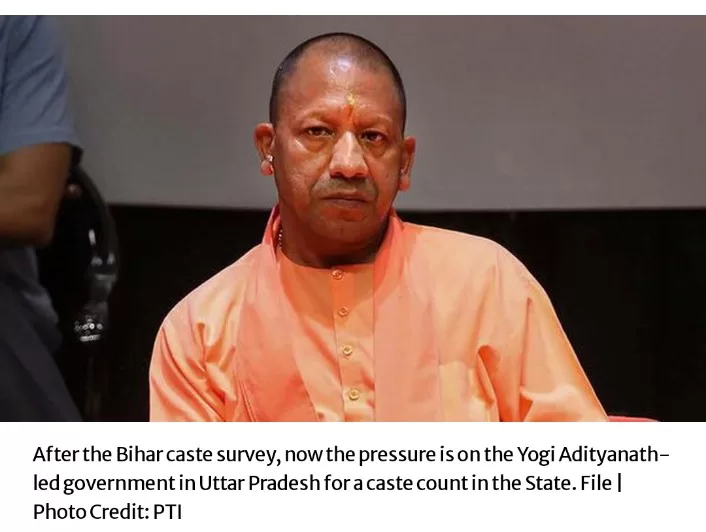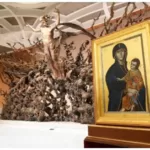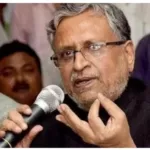LUCKNOW – Following the outcomes of the caste survey in Bihar, mounting pressure is now on the Yogi Adityanath-led government in Uttar Pradesh to conduct a comprehensive caste census. In an unusual alignment of interests, not only are opposition parties advocating for this census, but even the allies of the ruling Bharatiya Janata Party (BJP) are emphatically endorsing the idea. However, the state government has consistently maintained that conducting such a census falls outside its purview and has declared that it has no intentions to do so.
All three of the BJP’s coalition partners in Uttar Pradesh heavily rely on the support of Other Backward Classes (OBC):
1. The Suheldev Bharatiya Samaj Party (SBSP), led by Om Prakash Rajbhar, is predominantly composed of Rajbhars, an OBC community.
2. The Nishad Party, under the leadership of State Minister Sanjay Nishad, champions the traditional boatmen community.
3. The Apna Dal (Sonelal), which garners support from the Kurmis, is one of the most numerically influential OBC groups in U.P. after the Yadavs.
The SBSP Chief, Om Prakash Rajbhar, affirmed that his party, although part of the BJP-led National Democratic Alliance (NDA), considers the Caste Census in U.P. a non-negotiable demand. He vowed to pursue this matter vigorously through appropriate channels.
Union Minister Anupriya Patel, representing the Apne Dal (Sonelal), echoed this sentiment, demanding a caste census to obtain precise statistics on the OBC population. She asserted that this data would facilitate more effective solutions to address the challenges faced by backward castes. Furthermore, she called for the establishment of a separate ministry for OBCs. The contrary stance of these BJP allies may necessitate a reevaluation of the BJP’s strategy in the state.
Bahujan Samaj Party (BSP) President Mayawati, a prominent political figure, described the Bihar “caste census” as the initial step toward securing the constitutional rights of Other Backward Classes (OBCs). She emphasized that despite discomfort among some political parties, this step is essential for the constitutional rights of OBCs. She called upon the U.P. government to align its intentions and policies with the public’s sentiments and expectations, advocating for an immediate caste census. Mayawati concluded that true resolution would only be achieved when the Union government conducts a national-level caste census, ensuring the rightful claims of OBCs.
The Samajwadi Party (SP), U.P.’s primary opposition party, and the Congress have also voiced their demand for a caste census. Sunil Singh Yadav ‘Sajan,’ the SP’s national spokesperson, emphasized that their campaign for the 2022 Assembly polls centered on the necessity of a caste census. They argue that understanding the population and economic conditions of each caste group is crucial for the effective implementation of government policies.
Chief Minister Yogi Adityanath, during the Monsoon Session of the U.P. Assembly, asserted that the State government had no intentions of conducting a “caste census” in Uttar Pradesh. He cited the Census Rules of 1990 and the Census Act of 1948, which clearly delegate census responsibilities to the Union government.
The BJP’s strategy in Uttar Pradesh relies on engaging with OBCs through political representation and tailored economic policies. They are also leveraging Prime Minister Narendra Modi’s leadership and the party’s “Sabka Sath, Sabka Vikas” mantra to counter the opposition’s challenge.
The U.P. BJP’s OBC wing has planned an OBC Mahakhumbh, a massive gathering in Prayagraj scheduled for November. This event will feature the participation of top Central and State BJP leaders, highlighting the political representation and policies aimed at OBC communities.
Political analysts suggest that the BJP will capitalize on the significant political representation provided to OBCs under Prime Minister Narendra Modi’s leadership to navigate the demands for a caste census. The opposition, they argue, lacks influential non-Yadav OBC leaders like they did in the 1990s when they rallied around leaders such as Beni Prasad Verma.
The political landscape in Uttar Pradesh is evolving rapidly, with the caste census demand creating new dynamics that could shape the state’s future.







